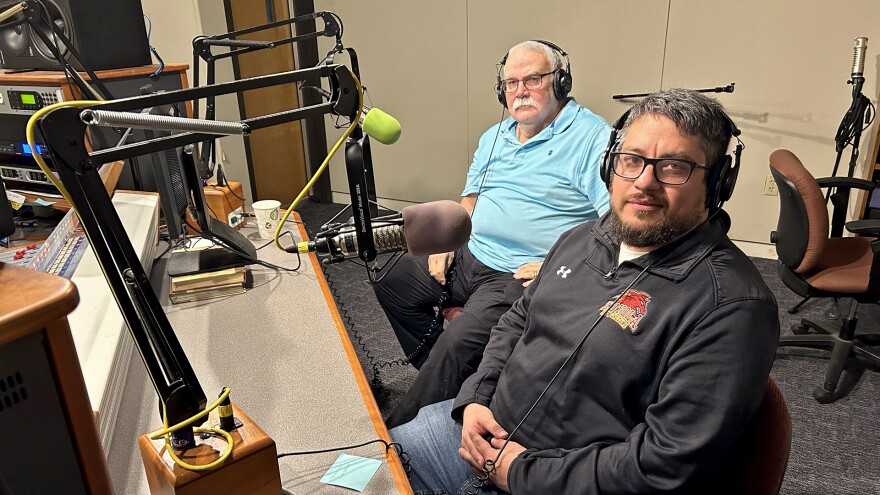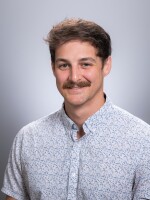The Archdiocese of New Orleans has been in bankruptcy court for nearly four years, seeking protection from dozens of lawsuits after revelations that more than 300 of the Catholic church’s workers were reported for sexual abuse.
The Guardian’s Ramon Vargas has been reporting on these cases for years and tracking the tactics the archdiocese is using to avoid responsibility.
In a conversation with the Gulf States Newsroom’s Drew Hawkins, Vargas and Aaron Hebert, a survivor in one of the abuse cases, discuss how important it is to shed light on these abuses — and how much more work there is to be done.
Content Warning: This story contains details of the sexual abuse of children. The following conversation has been edited and condensed for clarity.
Ramon, you've been covering sexual abuse of children by members of the clergy for a long time now, going back to your days back at the Times-Picayune. Can you talk about what drew you to this coverage and how it's changed and evolved over the years for you?
It was really a tip about a case in particular at Jesuit High School, which, I just happened to be an alum from. I was very quickly able to verify the veracity of that tip, because there was a tape with the school's president at the time, who had taught me Latin while I attended Jesuit. It just made sense for me to write that story. It was about a survivor named Richard Windmann and his abuse that he survived on the campus of Jesuit.
That was probably the most locally intense reaction, I think, to any piece I've ever done. And from there, there was just like a flood of tips. I just stayed with it because I knew that there was a lot to cover that hadn't been covered. My instinct was that went a lot deeper than I could ever imagine.
It sounds like it started on a personal level for you and has just broadened. Can you talk about how deep it's gone since you've been chasing this?
I think that when you look at how that was like a drop in a much larger ocean, you know you've got no less than 80 cases. That’s priests and deacons who are labeled as credibly accused by the Archdiocese of New Orleans. I know that there are triple the amount of people who have actually been accused. When you put together the number of unsubstantiated, the statistics that we know of cases of that nature that are unsubstantiated — and that's not to say false, because it's not that they're proven false, it's just that there's not the evidence required to substantiate them one way or the other — I think that all the evidence available to me is that there are many people that aren't on that list that should be on the list. You're talking like triple the number, and that's a conservative estimate.
You've had some really significant outcomes in the cases that you looked at — thinking specifically right now about a recent one you’ve done with WWL’s David Hammer. Can you talk about the impacts of your reporting?
I think that the one that illustrates the strongest impact was Lawrence Hecker.
Just to set it up, Lawrence Hecker was a priest who had been, basically, forced to retire in 2002 for molesting children that he met through his work. Right before I started working with David, one thing I was able to figure out and establish was that he had confessed in writing to his superiors that with at least seven children that he met through work, had either molested them or harassed them. This was in the ‘60s, ‘70s, ‘80s, and this confession was made in 1999. He was sent off for an evaluation, he was diagnosed as a pedophile and the church, essentially, allowed him to return to work.
And then, the 2002 scandal in Boston erupts, and he retires. For 16 years, before continuing fallout from the revelations in 2002 worldwide, they revealed that the reason that he retired all those years ago was because he was strongly suspected of child molestation. That confession had been suppressed and the church had filed for bankruptcy, and it was supposed to stay secret. And I was just like, this is not going to stay secret.
One of the things that we got an idea of as [Hammer] was reporting that story, was to knock on Lawrence Hecker’s door and see what he says. So we walk up, it's an apartment complex and there's a gate and there's seven names on there. There's one that has tape over it, and I'm like, there's one name missing here, and I know that he's in here. So, let’s ring that doorbell. And he answers.
And he's just standing there answering our questions for 18 minutes about the note. “Do you remember this?” “Yes, yes I do.” “Is this is this accurate? Evidently, yes.” Evidently, like, “I wouldn't have lied,” you know? And his whole point, I remember, was that things were just different back then and it wasn't that big of a deal.
RELATED: Priest admits sexual abuse of teens to WWL-TV
So, that interview posts and The New York Times does a story on that. CBS News did a story on that. Just a remarkable interview — it’s the first time that he's admitting that he did all this and the church didn't really do anything, and [he didn’t] really think [he] needed to be punished. And then the indictments came down like, within ten days, and he's indicted on rape and kidnapping charges.
I guess the point that I'm trying to get at is that I think that at that point, it just made it impossible to ignore.
That sort of doorstop confession — really dramatic. That couldn't be ignored. But there are so many other stories. What's next for your reporting? Are you are there more cases you're looking into in the region?
What’s so frustrating about this is that it takes such a long time to prepare and to move. You move the needle an inch, two inches and it takes you weeks to do it. Did the culture of covering that stuff up, did it succeed to the point that everyone is going to get away with it? Or can there be some consequences leveraged against people who knew and did nothing about it or who knew and actively worked against that person ever being held accountable? I think that's the question some of the reporting is going to reflect. What happens with that?
Aaron, turning to you for a bit: you're a survivor who's been really vocal about what happened to you. Can you tell us a little bit about your own experience and what it's like to be vocal in a place like Louisiana?
First off, let me thank you for having me here today. I'm here number one as a victim, survivor. And I'm also an advocate, a strong advocate for those who are abused by clergy members. I remember quite well what happened to me and the others that Father Hecker molested back in 1968 when I was an eighth-grade student at Saint Joseph in Gretna, Louisiana.
I'll never forget Father Hecker on his knees, looking up at me while he was groping me and groping my genitals. Father Hecker was a monster walking amongst us. My guilt that I carried, and the cross that I carry, is that all those years I didn’t tell anybody anything. He went on to other parishes and probably did other things to other children. Had I only opened up my mouth and told somebody about it, maybe the authorities could have done something about it.
Well, first of all, Aaron, thank you for sharing that with us. I know that wasn't easy. You talk about feeling like a man on a mountain isolated and how it was your own memory was repressed. Can you talk a little bit about how important it is to bring attention to these crimes, even if it's been decades in many cases?
It has been. Coming out and remembering the things that I remember and especially the friends that told me what happened to them, it just created a sense of having to accomplish getting the word out, letting the people know, letting whoever would listen to me take care. Because this man was still living amongst us. He was still walking amongst us. He was doing everything. Even the archdiocese gave him a big party to celebrate his 60th year as a priest.
My mantra, or my mission, is to get the word out to all the parishioners within the Catholic Church to see and open up their eyes to what's going on around them. I've kind of given up on the Catholic faith altogether. I don't need an institution to tell me that the Lord above is my God and savior.
This is a really impossible question here, but can I ask: What do you hope for the future of survivors of clergy abuse, like yourself? Is there an ideal resolution in your mind?
I would like to see transparency. I would like to see open honesty. I would like to see the apologies go more than just apologies. I want to see action taken. I would like to see anyone that's looking to become a priest, when they go to seminary school, to be psychologically evaluated not only as he comes into priesthood, but to be evaluated every year thereafter. Even when he becomes a priest at a parish, to have him evaluated and let the parishioners know the outcome of that. If they found out that this man is a pedophile, something should be done and let the local authorities know what this man is doing.
This story was produced by the Gulf States Newsroom, a collaboration between Mississippi Public Broadcasting, WBHM in Alabama, WWNO and WRKF in Louisiana and NPR.



